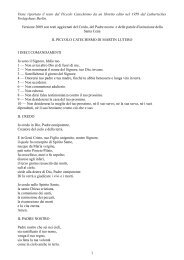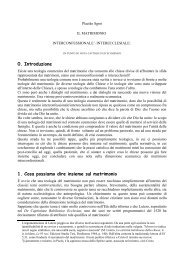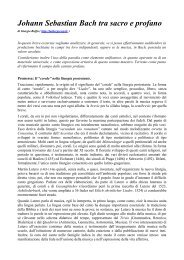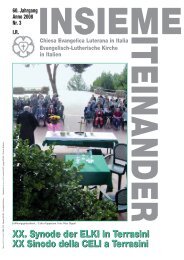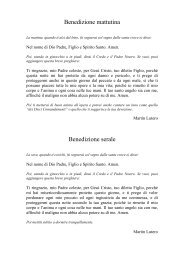Il dialogo ecumenico e interreligioso: quale futuro? - Nemesistemi
Il dialogo ecumenico e interreligioso: quale futuro? - Nemesistemi
Il dialogo ecumenico e interreligioso: quale futuro? - Nemesistemi
Create successful ePaper yourself
Turn your PDF publications into a flip-book with our unique Google optimized e-Paper software.
se stesso e verso l'umanità, senza pretese né pressioni... La maturazione umana sarebbe allora come<br />
una precondizione di certe ulteriori promesse evangeliche non recepite prima La maturazione<br />
umana nel <strong>dialogo</strong> significa cercare insieme per trovare e trovare per cercare ancora 1 . <strong>Il</strong> taglio<br />
antropologico del <strong>dialogo</strong> darà alla riflessione cristiana una sua dimensione di personalizzazione<br />
radicale, superando le trattative apersonali, cosificanti o soltanto ogettivanti 2 . In questo senso esso<br />
è 'conversione' 3 , o cioè passaggio nel <strong>quale</strong> l'umano lascia la sua 'chiusura disumana'.<br />
SUPERARE I SCOGLI DELL AUTORITARISMO<br />
La dinamica dialogale sostituisce quella previa del confronto controversiale 4 , per 'orientarsi<br />
insieme nella stessa direzione: Cristo'. Questa conversione dovrebbe, come nel caso di Saulo<br />
diventato Paolo, "far cadere i squami dalla vista delle Chiese" (Att. 9, 17-18) 5 . <strong>Il</strong> <strong>dialogo</strong> si<br />
distingue -in senso del tutto generico- dalle impostazioni mentali dell autoritarismo nella ricerca<br />
della verità 6 , compresa come un insieme di proposizioni garantite dall autorità di Dio 7 .<br />
Storicamente, il <strong>dialogo</strong> è l atteggiamento cristiano in un mondo dove esso non intende più<br />
prevalersi (o tentare di prevalersi) di una posizione di potenza o di forza, basata sul modello della<br />
cristianità 8 . In senso genericamente umano, il <strong>dialogo</strong> è una comunicazione reciproca che mira ad<br />
uno scopo comune o a una relazionalità interpersonale più profonda 9 . Si parlerà di <strong>dialogo</strong><br />
profondo con la sua priorità di incontro con mondi religiosi e culturali diversi 10 . La capacità<br />
1<br />
L. Sartori, <strong>Il</strong> <strong>dialogo</strong> <strong>ecumenico</strong>, in «Ut unum sint», 1970 nº 25, p. 9 (nº 2 d).<br />
2<br />
J. Speck, Karl Rahners theologische Anthropologie, München 1967, S. 36-37.<br />
3<br />
P. Lengsfeld, Macht als Factor in ökumenischen Prozesses, in «Una Sancta», 1973 nº 3, S. 239; cfr L. Sartori, <strong>Il</strong> <strong>dialogo</strong> <strong>ecumenico</strong>, in<br />
«Oikumenikon», 1970 nº 4, p. 37.<br />
4<br />
Y. Congar, Sur le jubilé de 1975, in «Unité des chrétiens», 1973 nº 12, p. 32.<br />
5<br />
Y. Congar, Chrétiens désunis, Paris 1937, pp. 329-330.<br />
6<br />
A. Maffeis, <strong>Il</strong> <strong>dialogo</strong> <strong>ecumenico</strong>, Brescia 2000, p. 92: «<strong>Il</strong> ricorso al metodo dialogico come via maestra per la ricerca della verità e per raggiungere<br />
il consenso gode di una plausibilità generale. Al contrario l'autoritarismo e la presunzione di una parte di possedere interamente e in modo esciusivo la<br />
verità sono stigmatizzati dall'opinione pubblica come comportamenti inaccettabili».<br />
7<br />
A. Maffeis, <strong>Il</strong> <strong>dialogo</strong> <strong>ecumenico</strong>, Brescia 2000, p. 92: «La controversia, infatti, nelle vane forme che ha assunto nel corso delta storia, ha inteso<br />
generalmente la rivelazione come un insieme di proposizioni la cui verità garantita dall'autorità di Dio che rivela e ha ridotto la fede at riconoscimento<br />
delta verità di tali proposizioni.. La problematicità del metodo della controversia deriva, dunque, non solo -e neppure primariamente- dal fatto che<br />
non corrisponde più allo spirito di tolleranza diffuso nella cultura, ma prima di tutto da un modo riduttivo di concepire la rivelazione e la fede<br />
comprese in termini esclusivamente dottrinali e oggettivanti <strong>Il</strong> superamento dei metodi predialogici nel confronto tra te chiese è andato di pari<br />
passi con lo sforzo compiuto dalla teologia di comprendere in modo più adeguato la rivelazione e la fede».<br />
8<br />
W. Visser t'Hooft, Hat die ökumenische Bewegung Zukunft?, in «Ökumenische Rundschau», 1975 nº 2, S. 162: «Es gibt Formen des Dialogs die<br />
einen Sinn haben. Zuerst der Dialog der davon ausgeht, daß es in dieser pluralistischen Welt viele Aufgaben gibt, die nur dann gelöst werden können,<br />
wenn Menschen jeder religiösen oder sogar nicht-religiösen Überzeugung sich zusammenschließen. Die Christen haben so lange eine besondere<br />
Machtposition in der Welt gehabt, daß sie sich noch immer nicht an die neue Situation, in der ihre Stimme eine unter vielen geworden ist, gewöhnt<br />
haben».<br />
9<br />
Cfr e. g. S. Karotemprel, Following Christ in Mission, Nairobi 1995, p. 101.<br />
10<br />
GLOBAL DIALOGUE INSTITUTE, The Power and Promise of Deep-Dialogue. Promoting Through Deep-Dialogue Intercultural - Interreligious<br />
Understanding and Creative Collaboration, in «Internet» 2004, http://www.astro.temple.edu/~dialogue/case.htm: «Deep-Dialogue is a way of<br />
encountering and understanding oneself, others, and the world at the deepest levels, which opens up possibilities of grasping individually and<br />
corporately the fundamental meanings of life and its various dimensions. Deep-Dialogue has three dimensions: Ethics, Globality, and Spirituality.<br />
Dialogue: Dialogue, understood as Deep-Dialogue, is an encounter with those whose view of the world is significantly different from our own-- an<br />
Inter-World Encounter. The primary purpose of this opening out is for each to gain a new insight into reality. Such a dialogical encounter enables<br />
each of us to view ourselves, others, and the world, as well as our understanding of it, from a new perspective, more "objectively" enriched through<br />
the eyes of others. This whole new way of understanding reality, which is opening up and being made explicit now at the turn of the third millennium,<br />
provides each of us the opportunity to probe the inner depth of the meaning of life as it faces us in the different dimensions of our experience:<br />
individually, with others, at work, in the family, on the several levels of community up to the global level, and amidst the world around us. Ethics:<br />
Ethics is the set of principles which each of us develops by which we decide how to act both in general and in particular situations. Because of the<br />
fluidity of modern society it is especially vital both for individuals and for communities to develop integrated, holistic ways of ethical behavior. At the<br />
same time it is essential that we enter respectfully into Deep-Dialogue with those whose ethical principles appear to be grounded differently from<br />
ours. That is: we need to experience Inter-World Encounters which will lead us through the Seven Stages, both to seek out what is held in common<br />
and to discern true differences. In the end it is necessary for human survival that such individual and group commitments to integrated ethical living in<br />
a dialogical context expand to the fullest, aiming at the joint discovery of a "Global Ethic." Globality: Globalization on the physical level is<br />
accelerating at such a rapid rate that intellectually and emotionally we humans need to focus our full attention on this reality if we are to survive on all<br />
three levels, intellectual, emotional and even physical -let alone flourish. However, globalization is likewise an incredible opportunity to overcome the<br />
"Divisive Dualisms" that have plagued humankind from the beginning: Body-spirit, men-women, black-white, rich-poor, labor-management,<br />
religious-secular, nation-nation, etc. A humane globalization cannot succeed by way of dominance. Rather, it can be accomplished only by Deep-<br />
Dialogue: within persons, among individuals, between groups, and onto the global level--issuing in a "Global Ethic," that is, the basic ethical<br />
principles discovered to be actually held world-wide, arrived at by consensus, brought about through Deep-Dialogue. Spirituality: Spirituality refers<br />
to the way each individual and groups inwardly understand the meaning of life and then outwardly give it expression. Thus, spirituality underlies all<br />
aspects of every-day life-- including every specific religion or ideology, each of which are particular crystallizations of that perception of the meaning<br />
of life and how to manifest it. As persons mature they enter into a kind of Deep-Dialogue within themselves, thereby giving shape to their personal<br />
understanding of the meaning of life -- their spirituality. Though this has often been done within the context of a religious tradition, today many are<br />
22



